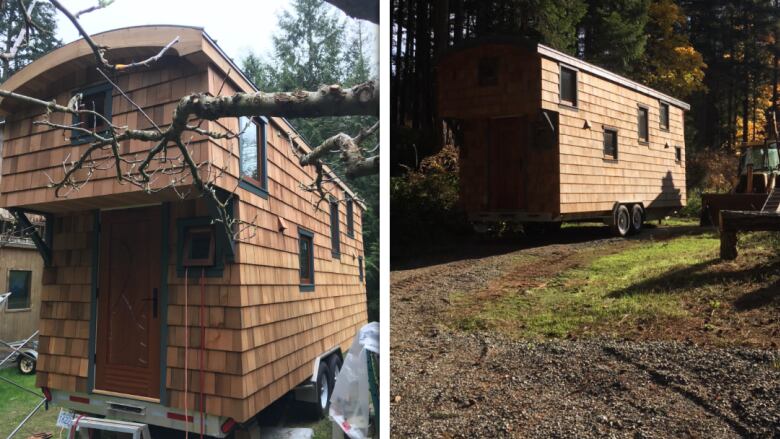'It's been incredibly liberating': Tiny homeowner on the benefits of downsizing

On Cross Country Checkup's show on the new national housing strategy, we spoke to listeners across the country facing homelessness and housing insecurity.
Caller Brian MacAllister resolved his affordable housing issues by building a tiny home, which has allowed him more freedom and disposable income. But the move came with concerns about what is legal when it comes to a mini-mobile home.
MacAllister says the federal government should redefine what a home is, so that more people can live securely, the way they want to.
Checkup host Duncan McCue spoke with MacAllister from his tiny home on Saltspring Island, B.C.
Will the national housing strategy make a difference when it comes to homelessness?
I don't know the intricacies of what's being proposed. But big strides could be made if changes were made to what we consider housing.
In my example, my family and I spent the past two years building a tiny home. We're now living in it and finding a new path to prosperity that we couldn't find when we were stuck in the rental trap. We would have fallen into that category of the working poor where we earn enough to get by, we earn enough to pay the rent, we earn enough to live our lives, but we don't earn enough to make the leap to becoming a property owner.
But by changing the way we live — living a different way —which is what we've done with the tiny house, has enabled us to see a much more prosperous future.
Tell us about your tiny home.
It's built on a trailer that's 18 x 24 feet, and if you include the lofts, it's 300 square feet. It houses my wife and I and our eight-year-old daughter. She has a little loft bedroom. It's very cozy and it's a wonderful way to live.

We've gone through a process of getting rid of all of the unnecessary things that we had and simplified our lives so that we could fit into a small space and it's been incredibly liberating and freeing. It's great. We wouldn't change a thing.
I'm a carpenter and I built the home myself. But the problem with tiny homes is that they're not, strictly speaking, legal. Many of us living in tiny homes realize that we're living in a way that's not necessarily defined as legal by municipal governments, federal governments or provincial governments. If changes were to be made in the housing strategy, the federal government could take a different look at what a home is.
I enjoyed listening to your last caller speaking about American tiny home villages. There's many places in the U.S. that have made big strides towards changing municipal laws to accommodate people who are trying to live in a different way. I think that could make a difference for people.
Did you run into any problems on Saltspring Island when you were trying to build your home?
We found somewhere for our home, but we don't live, strictly speaking, legally. So the government could show up any day they want and slap a notice on our door and tell us we can't live in our home. That's the reality that we'd run into basically anywhere in the province of B.C.
We're not living the way we're supposed to be living.
What was your housing situation before the tiny home?
Here in B.C. rents are so high that a little bit of disposable income, that we would like to put in our savings account every month, disappears into rent. And keeping up the cost of a home that doesn't belong to us. It's very frustrating. At the end of the year, you do your taxes and you look at how much money has gone into basically paying someone else's mortgage.
It's a hurdle and you need to get past that hurdle to own your own home. Some of us need to do that in creative ways. It would be so great if the government had a way to help people live simply and in a smaller, less expensive way.
What advice would you give to listeners who want to live in a tiny house?
I would say go for it. It's made a huge difference in our lives and it's made us appreciate our time together a lot more because our life is less wrapped up in trying to make ends meet every month. It's a quality of life issue.
Many of the people we can call the working poor have children who are in daycare with parents who are working. The family isn't spending time together. At the end of the day, you're just caught up in a cycle of debt that's self-defeating.
Since moving into the tiny home, it's been very liberating to find myself in a place where I can take a few days off and spend time with my family where we can go on a little trip because I'm not worried about that avalanche of bills every month.
Brian MacAllister's comments have been edited and condensed. To listen to the full interview, click on the audio link above. This online segment was prepared by Champagne Choquer on Nov. 27, 2017.